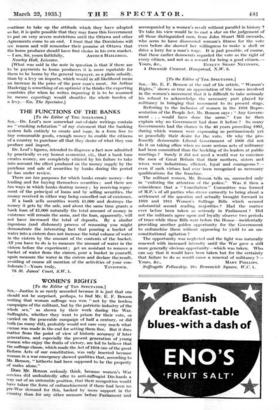THE FUNCTIONS OF THE BANKS [To the Editor of THE
SPECTATOR.] SIR,—Dr. Leaf's now somewhat out-of-date writings contain no " crushing refutation " of my statement that the banking system fails entirely to create and issue, in a form free to buy consumable goods, enough money to enable the citizens of a country to purchase all that they desire of what they can produce and import.
Dr. Leaf's figures, intended to disprove a fact now admitted by practically every honest economist, viz., that a bank loan creates money, are completely vitiated by his failure to take into account the effect produced on the money supply by the purchase and sale of securities by banks during the period he has under review.
There are two purposes for which banks create money—for lending and for buying themselves securities ; and there are two ways in which banks destroy money ; by receiving repay- ment of the principal of loans and by selling securities, the money received in either way being cancelled out of existence.
If a bank sells securities worth £1,000 and destroys the money it gets by the sale, and about the same time grants a bank loan of £1,000 naturally the total amount of money in existence will remain the same, and the loan, apparently, will not have increased the total of deposits. By a similar ingenious (and dishonest) process of reasoning you might demonstrate the interesting fact that pouring a bucket of water into a cistern does not increase the total volume of water in the cistern by the amount of the contents of the bucket. All you have to do is to measure the amount of water in the cistern before the experiment ; get an assistant to remove a bucket of water from the cistern, pour a bucket in yourself, again measure the water in the cistern and declare the result, avoiding of course all mention of the activities of your con- federate !—Yours truly, TAVISTOCK. 76 St. James' Court, S.W. 1.




























































 Previous page
Previous page